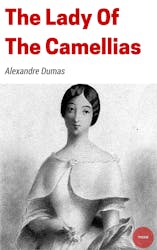Marguerite Gautier is a courtesan in the city of Paris. The symbol of her character is the camellia, pale and cold. She was once a needleworker who, while taking a rest cure in Bagneres, was befriended by a wealthy duke whose daughter she resembled. After the death of his daughter, the duke takes Marguerite back to Paris and introduces her into society. Somehow the story of Marguerite's past life is rumored on the boulevards, and society frowns upon her. She is respected only by a few friends who know that she longs for a true love and wishes to leave the frivolous life of Paris. She is heavily in debt for her losses at cards and has no money of her own to pay her creditors.
The Count de Varville, her latest admirer, offers to pay all of her debts if she will become his mistress. Before she gives her consent, however, she meets Armand Duval. Armand has nothing to offer her but his love. He is presented to Marguerite by her milliner, Madame Prudence, who pretends to be her friend but who is loyal to her only because Marguerite is generous with her money.
At first Marguerite scorns Armand's love, for although she longs for a simple life she thinks she could never actually live in poverty. Armand is persistent, and at last Marguerite loves him and tells him she will forsake her present friends and go away with him. She has a racking cough. Armand wants Marguerite to leave Paris and go to a quiet spot where she can rest and have fresh air.
Marguerite, Armand, and Nanine, her maid, move to a cottage in the country. For many weeks Armand is suspicious of Marguerite and fears she misses her former companions. Convinced at last of her true love, Armand loses his uneasiness and they are happy together. The garden flowers he grows replace the camellias she always wore in Paris.




